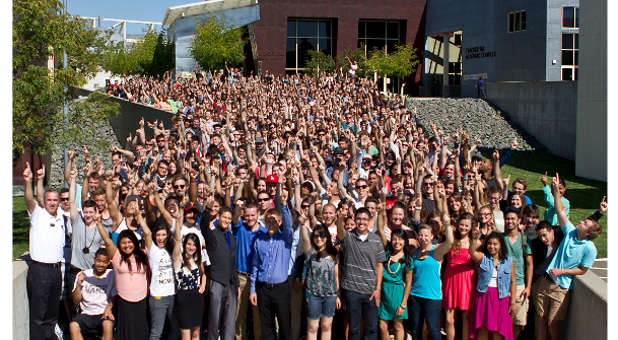6 Steps to Preserving Religious Freedom in Schools
Share:
In fall of 2013 and again this past August,Ward Melville High School officials in East Setauket, NY, rejected student John Raney’s application to start a Christian club.
John Raney was simply a student with a desire to serve his community as an outpouring of his Christian faith. Seeking to organize his efforts, he submitted an application to form Students United in Faith, a club dedicated to encouraging fellow students and making a difference in their community through food and resource distribution for the underprivileged.
But each time his school said, “no,” he wasn’t satisfied—and each time Liberty Institute stepped in to confront the school. Each year, under legal pressure from Liberty Institute, Ward Melville High School accepted John’s request, and the faith-based student club continues to serve his school and the community today.
But what does it take to win those victories, especially in cases involving students and school officials? If you’ve ever wondered what it takes to win a case for people of faith like John Raney—and the members of Students United in Faith—here’s what you need to know:
Step 1: An alert and informed community
Having eyes and ears across the country gives us a fighting chance. Without Catholics for Freedom of Religion, a Long Island organization dedicated to educating people of their religious rights, we may have never represented John Raney. When the group members heard of this then 16-year-old whose club had been denied acceptance at Ward Melville High School, they connected John with us and we were quickly on the case to help restore students’ religious liberty rights in this school.
Step 2: Courage
John Raney has grit. Giving into an oppressive bully would have been understandable considering his young age, but he chose to meet his opposition head on—twice. Part of what contributes to our success is the determination and courage of people who know their rights and fight for them, even when they’re in the minority. As long as people of faith continue standing up to those seeking to topple the First Amendment, religious freedom will be secured now and for future generations.
Step 3: Network of experts
Like seeks after like. It’s a social principle that is proved in our network of premier volunteer attorneys. Yes, Liberty Institute features some of the most gifted constitutional attorneys in the country, but it’s how we position and mobilize our network that truly makes us consistently effective. That is, the best volunteer attorneys want to work with us because of our standard of excellence, commitment to the First Amendment and desire for justice.
Liberty Institute’s expert staff attorneys, Hiram Sasser and Jeremy Dys, worked with our volunteer attorney Todd Harrison—a partner at McDermott Will & Emery—to represent John Raney in his case against Ward Melville High School. Without this strategic partnership between constitutional and litigation experts, this would not have been possible.
Step 4: Donor support
Our supporters ensure people like John Raney continue receiving the FREE representation they need. Liberty Institute, as a pro bono non-profit law firm, depends on the generosity of like-minded friends, and we are deeply thankful for each one of them.
Step 5: The right vision
We safeguard religious freedom in America. It’s that simple. And without a clear vision, even our best efforts will be inconsequential, or worse, ignoble. Knowing this, we are devoted to our vision to see people of faith living without the fear of religious repression.
Step 6: The grace of God
Religious expression isn’t a proposition up for discussion—it’s God given. True, the citizenry of many countries do not enjoy many of the freedoms Americans have, and we are thankful to the Lord for blessing us with the privilege of serving others through him. Without God’s grace, what we do wouldn’t be possible. It’s God who enables us to protect the freedoms He has given us, but it’s the same God who expects us to serve and worship Him even when our faith and freedoms are being challenged. Because of His grace, we work to ensure freedom of religious conviction and expression without fear of reprisal.
The True First Step: The law
It’s worth mentioning that before the above six steps came the essential “first step”: the Constitution of the United States and the laws, and court precedents that flow from it. Even in an America where many aspects of the law have been misinterpreted and twisted against freedom, the fact is that the law is predominantly on the side of religious liberty—especially in cases like Students United in Faith.
Share:






































